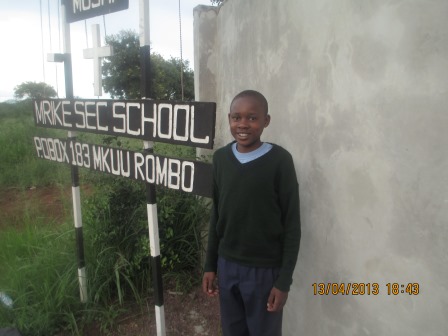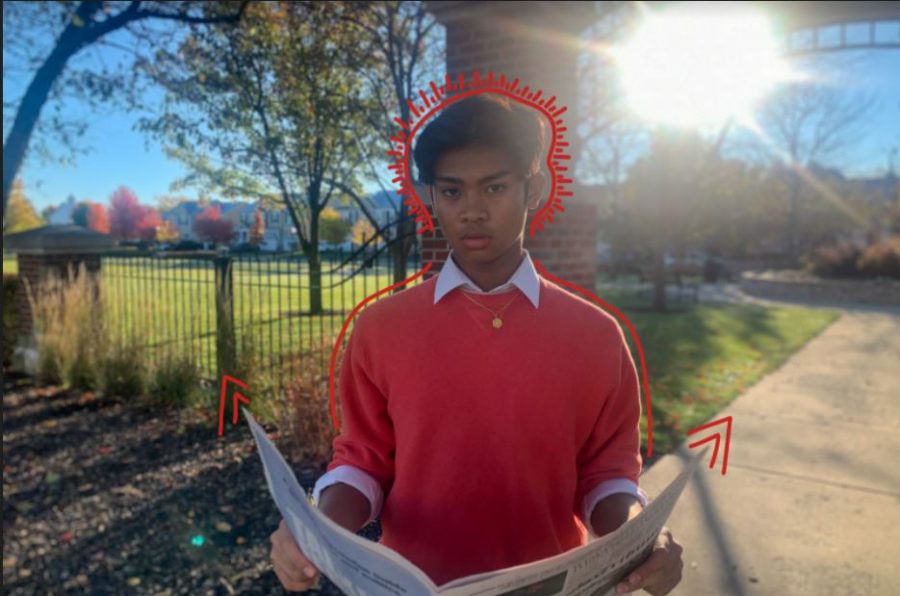People may not think our little community makes that much of a difference in the United States, and even less when it comes to the world. However, the reach of our little community extends farther than most people can imagine. In this case, Community High School District 117 is reaching all the way to Africa. With the help of people in the community, Antioch and Lakes Community High School students and teachers teamed up with people in the greater community to help the children of Moshi, Tanzania.
The story of how this unfolded begins with ACHS special education teacher Kerri Elliott.
“In 2008 I took a volunteering trip to Africa. I love to travel and always wanted to go to Africa. I volunteered to teach English and communication at the Kilimahewa Educational Center which is located by the base of Mt. Kilimanjaro,” said Elliott.
Elliott was surprised most by the students’ desire to learn. She knew that the poverty would be bad, but was struck by the kids who wanted to learn despite their situation. The kids asked every question they could to get the most out of her teaching.
“They wanted to learn so badly. They would write notes on newspapers because they did not have notebooks to write in,” said Elliott. “If a kid here does not have a notebook they won’t come to school, but kids there will take anything to write things down and learn.”
Elliott fell in love with the story of the school. School in Tanzania is different from the United States. Primary school is up to age thirteen and is in Swahili, the native language in that part of Africa. Secondary school is taught in English and students are required to pass a test written in English to get into secondary school.
“The idea that education is free and open to all is a privilege of the Western world,” said Elliott. “In reality it costs money. The teachers cost money, the building costs money, the supplies cost money and they do not have a lot of money. It is only open to a select few there.”
Only about ten percent of students pass the entrance exam to get into secondary school. These are usually people who go to boarding schools or English schools, and they are usually only the rich. Furthermore, only about 15 percent of the population speaks English. Elliott sees this as a big problem.
“These young kids that do not get into secondary school usually end up in poverty and get involved with drinking and drugs. Girls get married off and have babies at a young age. Without school they just move onto the next phase of life which is getting married and go to work,” she said.
The elders in the village saw this as a problem, too, and worked together to remedy it. They had an adult meet with the kids once a day and teach them one thing he or she knew.
“I thought it was amazing that this community had done everything in its power to create a school and do everything in their power to get these kids into school,” said Elliott. “Some of these kids walk for two hours to get to school.”
Later that year, Elliott came up with an idea to send school supplies to the kids who were writing on bits of newspaper.
“I saw how at the end of the year [American] kids would just throw out all those half-used notebooks and it gave me the idea. I met with a couple of teachers and did a school supplies drive with students donating supplies in their classes from both Antioch and Lakes. Once we had collected all the supplies, ACHS’s student council and National Honor Society and LCHS’s Key Club and National Honor Society paid for the packaging and shipping of the supplies over to Tanzania through their fundraisers. We shipped 70 supply packages which each included a five subject notebook, pencils, pens and glue, “ Elliott said.
Another big fundraiser that the schools did was “Dress on a Dime,” which raised around $1,500. People came from as far as Round Lake and Gurnee to buy dresses. Elliott used that money to buy the kids at Kilimahewa Educational Center new textbooks.
After that first year of teaching, Elliott has returned to Moshi each of the five following years and will be going for a sixth year this summer.
“My second year I did not directly teach, but I worked with the teachers and government officials to come up with a curriculum that lasted a whole year for Business Math, Communication and English. I took a more administrative role for the school and sometimes subbed in when a teacher was not able to teach,” said Elliott.
This was also the year Elliott and two other teachers, Jillian Swinford and Moira Madonia, started a non-profit organization: Edpowerment. Edpowerment is a top rated non-profit by greatnonprofits.org.
“When I came back this year I asked the elders what we could do to help them more, and they said water. The elders explain to me why the schools attendance was so low at the time was because the kids had no water or food. Attendance was at around 50 percent at the time. I told them I am just a teacher, but I will see what I can do. When I came back to Antioch I talked to the Diversity Club, National Honor Society and Student Council, with the Diversity Club leading the way, mostly,” said Elliott. “They came up with the Teacher Town Showdown.”
Many teachers participated in the Teacher Town Showdown and many students came as well, which helped raise money for this project. Diversity Club also sold water bottles and water bracelets to raise money.
Through Antioch, Lakes and a few other high schools, they were able to raise $8,000 dollars to drill a well in Tanzania.
“The money was just to drill and see if there was any water there. We had no idea if there actually was any water there before,” Elliott said. “Fortunately there was water where we drilled in an aquifer that would give water for a very long time.”
“[Madonia] found us a donor to pay for the pumps to extract water. The well opened in the village in 2011. It gives water access to over one hundred families,” said Elliott. The drilling brought attendance at the Kilimahewa Educational Center to 98 percent.
Another bonus of having access to clean water was that the school day could be extended and a lunch program could be put into effect.
“After we put the well in, we really thought that Edpowerment was going somewhere,’’ said Elliott.
The three members on the board all had different ideas on what should be done so they all started to focus on the goals of Edpowerment. The three focuses are the Kilimahewa Educational Center, helping children attend higher education who cannot afford it and Autism Connects Tanzania.
Autism Connects Tanzania’s goal is to educate the Tanzanian people about mental and physical disabilities. In Tanzania, it is believed that children who are mentally disabled are possessed by the devil and it is the parents’ fault for these things. This social stigma results in parents keeping their children with mental disabilities hidden in their houses for the rest of their lives without getting the help they need. Autism Connects helps teach the people that no one is at fault for these disabilities and that these children need help.
“After this got off the ground I met with Rotary Club to ask for funds and they suggested the idea of having kids who have expressed interest in what I do come with and start an Interact Club,” said Elliott.
Senior Jackson Boeh, a member of Interact Club, said, “Each year we raise enough money to pay for the kids’ food program at Kilimahewa Educational Center so they have food to eat during school.”
The food program is paid for mostly by the annual chili cook-off hosted by Interact Club. Boeh also went on the volunteering program the second year it was offered.
“While there, I taught mathematics to the kids at Kilimahewa,” said Boeh.
Senior Sara Young was the other member from ACHS to go on the trip and she taught English. They went with students from all over on the volunteering trip.
Boeh found the trip to be a life-changing experience.
He said, “I thought it was eye-opening how resourceful the people are over there. We think we recycle well here but the people use everything they can to make their lives better. The kids were all so polite and took advantage of every learning opportunity they had. It made me feel grateful for all the opportunities I have back in the states.”
Another project Boeh and Young adopted while they were in Tanzania was to paint a playground that had been designed and put together by the people who went the year prior.
People can get involved by donating things to the center. The ACHS soccer team gave funds so that the kids could receive soccer balls. The ACHS volleyball and basketball teams both donated their old jerseys for the students to wear during fitness exercises. At LCHS, the wood shop classes created mini chalk boards for the kids.
For more information on Elliott’s organization, please check out www.edpowerment.org.







![The Black Lives Matter movement has become a growing trend in recent years. Everything people post on Instagram and everything [related to] politics is a trend now sophomore Kelsey Aviles said. Despite how serious of a topic it is, some individuals post about BLM specifically because it is trendy.](https://www.sequoitmedia.com/wp-content/uploads/2020/12/Untitled-Artwork-3-900x318.jpg)